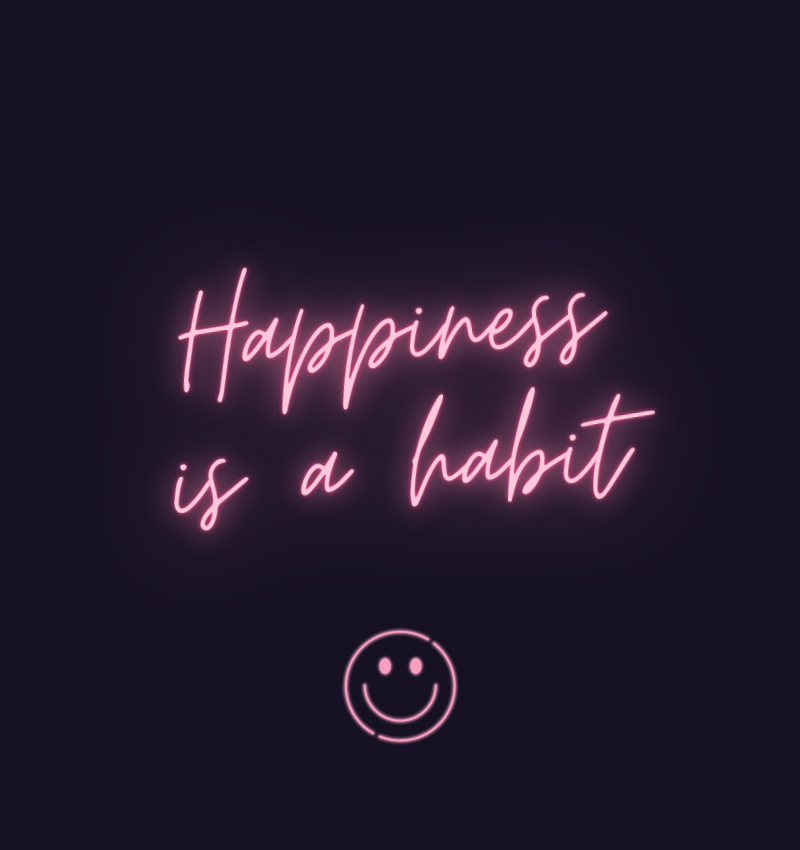Habits are the small actions and behaviours that we do repeatedly and consistently, often unconsciously, on a daily basis. They shape our routines, our mindset, and ultimately our lives. Habits can be both positive and negative, and can greatly impact our health, productivity, and happiness.
Habits are formed when we repeatedly do something until it becomes automatic. This happens because the neural pathways in our brain adapt to the repetition of the action and make it easier for us to do it without thinking.
This is why breaking a bad habit can be so difficult, as our brains have become wired to crave the action and reward associated with it.
Positive habits, on the other hand, can be incredibly powerful tools for personal growth and success. By consciously choosing to adopt positive habits, we can improve our physical and mental health, increase our productivity, and enhance our relationships with others.
Some common positive habits include regular exercise, meditation or mindfulness practices, reading, journaling, and maintaining a healthy diet. These habits can help to reduce stress, improve focus and concentration, boost energy levels, and enhance overall well-being.
Negative habits, on the other hand, can hold us back and hinder our personal growth. These may include smoking, excessive drinking, overeating, procrastination, and negative self-talk. These habits can lead to poor health, decreased productivity, and negative self-image.
Read this study about habits here: Making health habitual: the psychology of ‘habit-formation’ and general practice – PMC
SCIENCE OF HABITS
One of the key components of the science of habits is understanding the habit loop. This loop consists of three parts: the cue, the routine, and the reward. The cue is the trigger that sets the habit in motion, the routine is the behaviour itself, and the reward is the outcome or feeling that reinforces the behaviour.
Researchers have found that habits are formed through a process called neuroplasticity, which involves the rewiring of neural pathways in the brain.
When we repeat a behaviour consistently, our brains form stronger connections between the neurons that are responsible for that behaviour. This makes the behaviour easier and more automatic over time.
HOW LONG DOES IT TAKE A HABIT TO FORM?
One common question regarding habits is how long does it take to form a habit. The answer to this question is not a simple one, as many factors can influence the time it takes to form a habit.
One study conducted by researchers at University College London found that habits can form in as little as 66 days.
Read the study here: https://www.ucl.ac.uk/news/2009/aug/how-long-does-it-take-form-habit
Additionally, the complexity of the behaviour can also influence the time it takes to form a habit. Simple habits, such as drinking a glass of water in the morning, may form more quickly than complex habits, such as learning to play a musical instrument.
Another important factor to consider is the individual’s level of motivation and commitment to forming a habit. Individuals who are highly motivated and committed to forming a habit are more likely to succeed than those who are not.
Another important aspect of the science of habits is understanding the role of motivation and commitment in habit formation. While motivation and commitment can help initiate new habits, they are often not enough to sustain them over time. Research has shown that environmental cues and social support can be more effective in maintaining habits than relying solely on willpower.
INTERESTING FACTS ABOUT HABITS
Habits are a fundamental part of human behaviour, and they play an important role in shaping our daily lives. Here are some interesting facts about habits that you may not have known:
Habits are deeply ingrained in our brains:
Habits are formed in the basal ganglia, a region of the brain responsible for regulating motor and cognitive functions. When we perform a behaviour repeatedly, the basal ganglia creates a neural pathway that makes the behaviour more automatic.
Habits are automatic:
Once a habit is formed, it becomes an automatic behaviour that requires little to no conscious thought. This is why it can be challenging to break a habit, as it has become deeply embedded in our subconscious.
Habits can be contagious:
We are influenced by the habits of those around us. If our friends and family members have positive habits, such as exercising or reading, we are more likely to adopt these habits ourselves.
Habits can be changed:
Although it can be challenging to break a habit, it is possible to change it. By using strategies such as mindfulness, positive self-talk, and building accountability, anyone can break a negative habit and create a new, positive one.
Habits can impact our overall health:
Our habits can have a significant impact on our overall health and well-being. Positive habits such as exercising and eating a healthy diet can reduce the risk of chronic diseases such as heart disease and diabetes.
Habits can be disrupted by stress: Stressful situations can disrupt our habits, making it more challenging to maintain positive behaviours. It’s important to develop strategies for managing stress to help maintain positive habits.
Habits can improve productivity:
Positive habits such as planning and prioritising can improve productivity and help us achieve our goals more efficiently.
Habits can bring happiness:
Engaging in positive habits can bring a sense of accomplishment and happiness. By setting and achieving goals through positive habits, we can improve our overall well-being and satisfaction with life.
How to break negative habits;
Habits are a fascinating aspect of human behaviour that plays a significant role in shaping our daily lives. Whether positive or negative, habits can impact our health, productivity, and overall well-being. By understanding the science of habits and using strategies to create positive change, anyone can improve their habits and create a more fulfilling life. Negative habits can be a challenging process, but with dedication and commitment, it is possible to create positive change in your life.
Here is a list of strategies you can use to break negative habits:
- Identify the habit: The first step in breaking a negative habit is to become aware of it. Identify the habit, and when and where it occurs.
- Understand the habit: Try to understand the reasons behind the habit. What triggers the behaviour, and what purpose does it serve?
- Set a goal: Define a clear goal for breaking the habit, and write it down.
- Create a plan: Develop a plan for breaking the habit. This could involve replacing the negative behaviour with a positive one or gradually reducing the behaviour over time.
- Make a commitment: Make a commitment to breaking the habit, and hold yourself accountable.
- Build a support system: Enlist the support of friends, family, or a professional counselor or therapist.
- Practice mindfulness: Use mindfulness techniques to become more aware of your thoughts, feelings, and behaviours.
- Use positive self-talk: Use positive affirmations and self-talk to reinforce the desired behaviour and build self-confidence.
- Track your progress: Keep track of your progress, and celebrate your successes.
- Be patient and persistent: Breaking a negative habit takes time, so be patient and persistent. Don’t give up, even if you experience setbacks along the way.

Breaking negative habits requires commitment, dedication, and persistence. By identifying the habit, setting a clear goal, creating a plan, building a support system, and using mindfulness and positive self-talk, anyone can break the cycle of negative habits and create positive change in their lives.
Remember, change takes time, but with determination and effort, anything is possible.
HOW TO MAKE POSITIVE HABITS STICK
- Start small: Start with a small, achievable goal. If you want to start exercising regularly, for example, start with just 10 minutes a day.
- Be consistent: Consistency is key when it comes to making a habit stick. Do the new behaviour at the same time each day, or on the same days each week.
- Use reminders: Use reminders to help you remember to do the new behaviour. This could be a sticky note on your computer or an alarm on your phone.
- Build accountability: Enlist the help of a friend, family member, or accountability partner to help keep you motivated and on track.
- Practice self-compassion: Be kind to yourself if you have a setback. Remember that it takes time to develop a new habit, and setbacks are a normal part of the process.
- Celebrate small victories: Celebrate your progress along the way. This could be as simple as treating yourself to a favourite snack or taking a relaxing bath.
- Track your progress: Keep track of your progress to help you stay motivated. This could be a journal, a habit-tracking app, or a calendar.
- Visualise success: Visualise yourself successfully completing the new habit and the positive impact it will have on your life.
- Be patient: Making a habit stick takes time, so be patient and persistent. Don’t give up, even if progress is slow.
- Make it enjoyable: Finally, make the new habit enjoyable. Find ways to make it fun or rewarding, such as listening to music while exercising, or rewarding yourself with a favourite activity after completing the new habit.
In conclusion, making a new habit stick requires patience, persistence, and the right strategies.
By starting small, being consistent, using reminders, building accountability, practicing self-compassion, celebrating small victories, tracking progress, visualising success, being patient, and making it enjoyable, anyone can make a new habit stick and create positive change in their lives.
Remember, developing a new habit is a journey, not a destination, so enjoy the process and celebrate your successes along the way.
